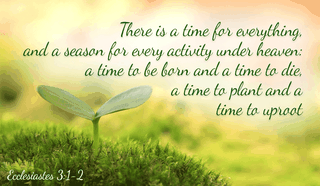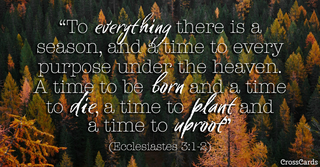- Recent Translations
- All Translations
Chuándàoshū 3
Share
Settings
Chuándàoshū 3 Commentary
Chapter 3
The changes of human affairs. (1-10) The Divine counsels unchangeable. (11-15) The vanity of worldly power. (16-22)
Verses 1-10 To expect unchanging happiness in a changing world, must end in disappointment. To bring ourselves to our state in life, is our duty and wisdom in this world. God's whole plan for the government of the world will be found altogether wise, just, and good. Then let us seize the favourable opportunity for every good purpose and work. The time to die is fast approaching. Thus labour and sorrow fill the world. This is given us, that we may always have something to do; none were sent into the world to be idle.
Verses 11-15 Every thing is as God made it; not as it appears to us. We have the world so much in our hearts, are so taken up with thoughts and cares of worldly things, that we have neither time nor spirit to see God's hand in them. The world has not only gained possession of the heart, but has formed thoughts against the beauty of God's works. We mistake if we think we were born for ourselves; no, it is our business to do good in this life, which is short and uncertain; we have but little time to be doing good, therefore we should redeem time. Satisfaction with Divine Providence, is having faith that all things work together for good to them that love him. God doeth all, that men should fear before him. The world, as it has been, is, and will be. There has no change befallen us, nor has any temptation by it taken us, but such as is common to men.
Verses 16-22 Without the fear of the Lord, man is but vanity; set that aside, and judges will not use their power well. And there is another Judge that stands before the door. With God there is a time for the redressing of grievances, though as yet we see it not. Solomon seems to express his wish that men might perceive, that by choosing this world as their portion, they brought themselves to a level with the beasts, without being free, as they are, from present vexations and a future account. Both return to the dust from whence they were taken. What little reason have we to be proud of our bodies, or bodily accomplishments! But as none can fully comprehend, so few consider properly, the difference between the rational soul of man, and the spirit or life of the beast. The spirit of man goes upward, to be judged, and is then fixed in an unchangeable state of happiness or misery. It is as certain that the spirit of the beast goes downward to the earth; it perishes at death. Surely their case is lamentable, the height of whose hopes and wishes is, that they may die like beasts. Let our inquiry be, how an eternity of existence may be to us an eternity of enjoyment? To answer this, is the grand design of revelation. Jesus is revealed as the Son of God, and the Hope of sinners.
Chuándàoshū 3 Commentaries
Chapter Summary
INTRODUCTION TO ECCLESIASTES 3
The general design of this chapter is to confirm what is before observed, the vanity and inconstancy of all things; the frailty of man, and changes respecting him; his fruitless toil and labour in all his works; that it is best to be content with present things, and cheerful in them, and thankful for them; that all comes from the hand of God; that such good men, who have not at present that joy that others have, may have it, since there is a time for it; and that sinners should not please themselves with riches gathered by them, since they may be soon taken from them, for there is a time for everything, Ec 3:1; of which there is an induction of particulars, Ec 3:2-8; so that though every thing is certain with God, nothing is certain with men, nor to be depended on, nor can happiness be placed therein; there is no striving against the providence of God, nor altering the course of things; the labour of man is unprofitable, and his travail affliction and vexation, Ec 3:9,10; and though all God's works are beautiful in their season, they are unsearchable to man, Ec 3:11; wherefore it is best cheerfully to enjoy the present good things of life, Ec 3:12,13; and be content; for the will and ways and works of God are unalterable, permanent, and perfect, Ec 3:14,15; and though wicked men may abuse the power reposed in them, and pervert public justice, they will be called to an account for it in the general judgment, for which there is a time set, Ec 3:16,17; and yet, such is the stupidity of the generality of men, that they have no more sense of death and judgment than the brutes, and live and die like them, Ec 3:18-21; wherefore it is best of all to make a right use of power and riches, or what God has given to men, for their own good and that of others, since they know not what shall be after them, Ec 3:22.


